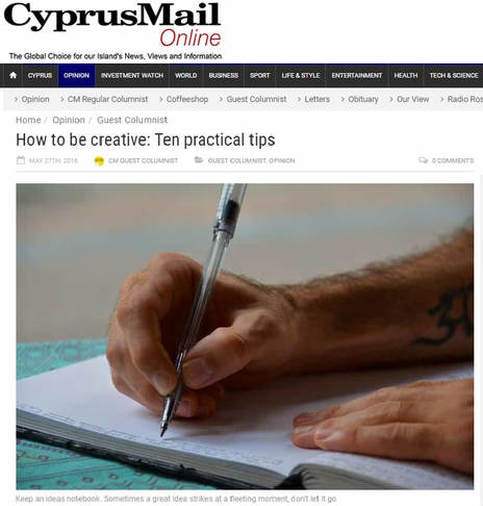|
We are creative when we imagine something new and make it happen. Thinking and action are both involved. The “new” need not be a huge breakthrough or a “first in the world”, it can be a simple improvement that adds a little value to our life. All people are creative, some more, others less. We choose to use and develop our creativity, or we lay it to rest. The accelerating pace of change generates new challenges, many of which cannot be resolved simply with know-how and judgment. Which is why creativity is more than ever a desirable set of skills: fluency(generating lots of ideas), flexibility (generating ideas that fall into many different categories) and originality(generating rare ideas).
Here are some practical tips on how to be creative: 1. Tackle your challenges in stages: Prepare. Check facts, feelings and what you wish to achieve. Imaginatively defining a challenge will help resolve it more imaginatively too. Ideate. Generate many ideas to resolve your challenge. Then choose the good ideas and analyse them in depth. Then choose the best. Act. Figure out how to implement those best solutions, who will do what and by when. Do it. If it turns bad go back to preparation or ideation. 2. Suspend judgement. When you’re generating ideas get your critical self to calm down for a while. It’s not that he’s not useful but he can seem threatening to other people and to your own creative self. 3. Practice critical thinking actively. After you’ve got some ideas, find positives for ideas you don’t like and negatives for those you like. Then choose. 4. Use creative techniques. Work on your powers of association and combination as you seek connections from sensual or verbal stimuli. Ask “what if”? Seek impossible solutions, deliberately. Take a trip to your childhood with stories, words or pictures, but make sure you come back. 5. Select where you want to be creative. Unsurprisingly you will be most eager to expend your creative energy in areas you love and in which you are already good. 6. Seek new experiences. These will further stimulate your curiosity and your capacity to generate ideas. 7. Keep an ideas notebook. Sometimes a great idea strikes at a fleeting moment, don’t let it go. 8. Embrace ambiguity. Recognise tensions and contradictions, be comfortable in chaos accept there is always a yin and a yang. 9.Work alone and with others. Both solitude and group creativity are useful, make the most of them. Remember to create a climate of open expression and debate. 10. Take personal responsibility for your own creativity. Yes, you might have to change your lifestyle, often. Remember you are making something new happen, something must change. More importantly, you need courage. New can be uncomfortable and risky, so learn to embrace mistakes and failure before moving on. Developing your creativity is a matter of thinking, doing and being. Some of these tips call for learning and practice, others for lifestyle changes. Unless you are perfect today you might try out the easy ones first.
0 Comments
Leave a Reply. |
LATEST POSTS
Archives
July 2021
|

